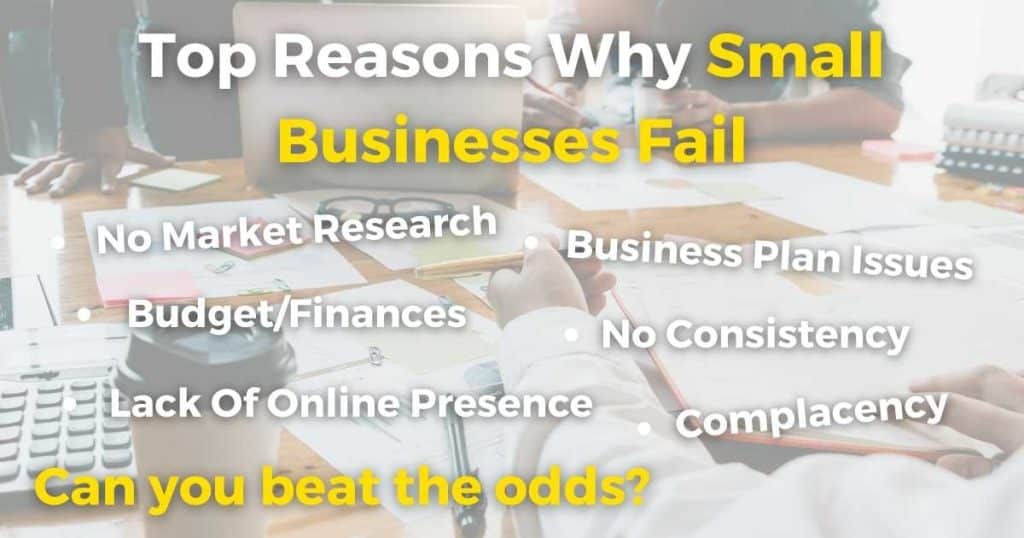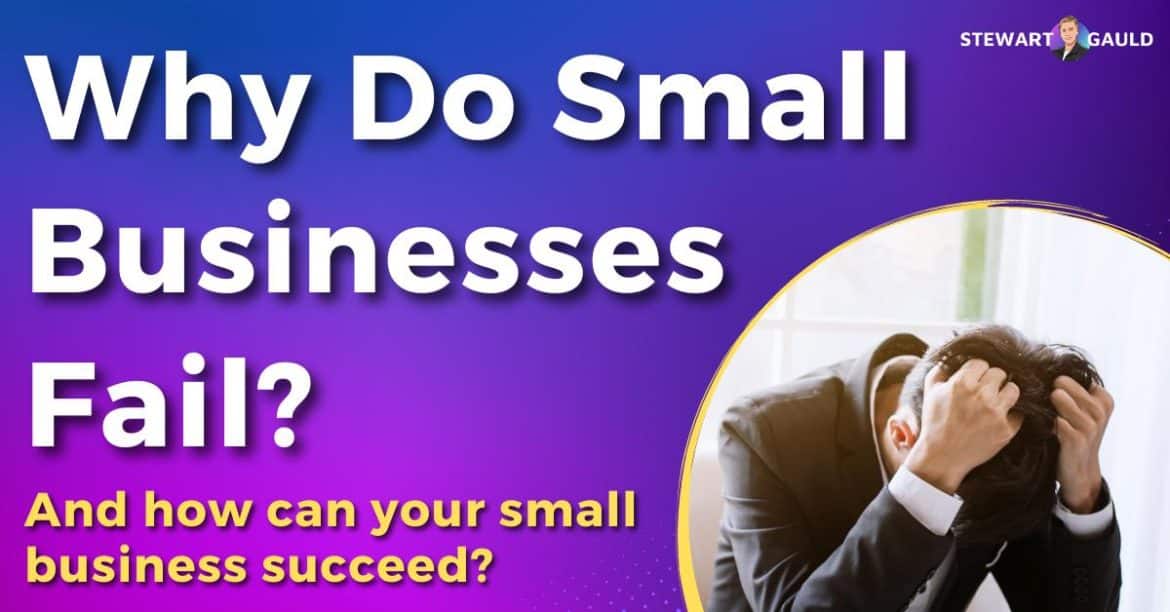Why do most small businesses fail? And how can you avoid small business failure?
Many new businesses enter the market yearly, yet unfortunately, only a fraction thrive long-term.
So, what factors contribute to the recurring phenomenon of businesses failing over time?
Well, that’s exactly what I’m going to uncover!
By identifying where most small businesses fail, you can determine the areas you need to zone in on to improve your chances of success!
Read more: My Top 10 Best Small Business Tools.
What Percentage Of Businesses Fail?

If you’re a small business, you’ve probably seen these stats floating around from the Bureau Of Labor Statistics:
- Around 20% of new businesses fail within the first year, then 50% during the first five years.
- And shockingly, only 25% of businesses actually make it past the 15 year mark!
So, why do so many fail year after year? And how do you become one of the small businesses to beat the odds?
Read more: How Much Does A Small Business Website Cost?
Why Do Most Small Businesses Fail? Top 6 Reasons

I know the above statistics can seem scary. But let me tell you, if you implement the right planning and strategies, you’ll significantly reduce the chance of being one of them!
In this guide, I’ll walk you through the most commonly observed mistakes made by startups and aspiring business owners and explore strategies to improve your chance of success!
So, if you’re serious about building a successful and profitable business, listen up!
Neglecting Market Research
Okay, so you have a new business idea, and you’re super excited about it. This is great!
But for some people, their desire to launch a new business actually blinds them from recognizing if people need your product or service!
For example, let’s say your long-time dream is to establish your own real estate agency, and you finally have the resources to bring this vision to life.
What you may not consider is that there could be a significant current downturn in the housing market or over-saturation of agencies within the area.
Therefore, it will be extremely challenging for you to penetrate the market, and this critical oversight sets the stage for failure right from the start!
It is crucial to identify gaps or unfulfilled demands within a market and position your product or service to meet those needs.
Think about it….It’s far more feasible to cater to an existing need than to create one and persuade potential customers to invest in it!
Read more: How To Start A Business With No Money.
Challenges with Business Plans
A well-structured and realistic business plan forms the foundation of a thriving enterprise.
But firstly, what is a business plan?
Your business plan essentially outlines attainable business objectives, strategies to achieve them, and potential obstacles with corresponding solutions.
Through research and surveys, your plan should identify the market need for your business, determine the resources and costs, and establish a timeline with actionable strategies.
Once you’ve got your business plan – there’s one crucial rule – stick with it. If you don’t, you’re asking for trouble!
More specifically, stick within your budget and stay on track with your initial strategies. And objectives.
If you think your business plan may be inaccurate, it’s important to take the time to change it and follow your new plan as soon as possible.
The more mistakes made, the more costly they become, increasing the likelihood of failure (more on finances in a minute).
In saying this, it’s important to be a little bit flexible!
You may need to visit, revisit, or revise your business plan if unforeseen market conditions negatively impact your business.
Read more: 7 Best CRM Software For Small Business.
Finances
This one is so important! After all, you have to spend money to make money, right?
Well, insufficient funding or working capital is another primary contributor to the failure of small businesses.
Business owners may clearly understand their day-to-day financial needs, but often, the issue arises when they struggle to gauge their revenue generation accurately.
This can lead to inadequate cash flow management.
Additionally, many aspiring entrepreneurs enter the business world without a steady job and fail to recognize that building a positive income typically takes two to three years!
Therefore, business owners should create a realistic budget and be willing to inject capital from their personal funds if required.
Furthermore, I advise business owners to have a supplementary income source, such as a side job, especially in the early days of their business venture.
Read more: 21 Business Ideas That Require No Money.
Bad Online Presence and Marketing
I’m sure you know that if your business relies heavily on foot traffic but is located in a hard-to-find place, you’ve instantly got a problem.
But did you know that the same applies to your presence on the Internet?
In today’s digital era, your online visibility and social media influence can be just as vital as the physical location of your company!
Establishing an online presence lets people discover and engage with your business easily.
To learn more, check out my digital playbook, Go Digital Now, which guides you through how to grow your online business effectively from the ground up!
We all know how important marketing is for a small business, but targeting the right audience when thinking about your marketing strategies is important.
For instance, large billboards might not be the best approach for an Internet-based company, just as online ads may not suit a heavy-construction business.
Once you’ve established the demand for your product or service, it is vital to ensure you effectively reach the audience who genuinely requires what you offer.
Read more: Is It Possible To Do Your Own SEO?
Complacency
After meticulously planning, establishing, and building your business and customer base, some business owners fall into complacency.
You should not do this! You should constantly be learning, monitoring the market, and staying ahead of the curve by keeping up with the latest trends.
Plus, recognizing when you need to adjust your business plan is key!
By staying well-informed about emerging trends, you can proactively adapt your strategy to ensure ongoing success.
Lack Of Consistency
If you want to become successful in the business world, you must be in it for the long run!
Building a thriving business takes time, perseverance, and a lot of hard work.
I know that when I first started my digital marketing agency, I worked 7 days a week, sometimes for 12 hours a day.
And I can guarantee that this is the case for most! Behind every successful business is a hard-working entrepreneur grinding daily (especially in the early days).
I recommend dedicating time daily to take at least one action to enhance your visibility or credibility.
It may seem small at first, but the cumulative effect of these incremental steps will soon pay off and lead to much greater success!
Read more: 7 Best Project Management Software For Small Businesses.
Stews Final Thoughts
And there you go! These are some of the most common reasons why small businesses fail.
Though the statistics show that approximately 20% of businesses fail within the first two years, this does not imply that failure is inevitable
By avoiding these mistakes, you position yourself as part of the 25% of businesses that survive and thrive beyond the 15-year mark.
Starting a new business will always have ups and downs, but don’t give up!
Work hard, be passionate, and enjoy the ride!
Thanks so much for reading, and good luck for your small business venture.

